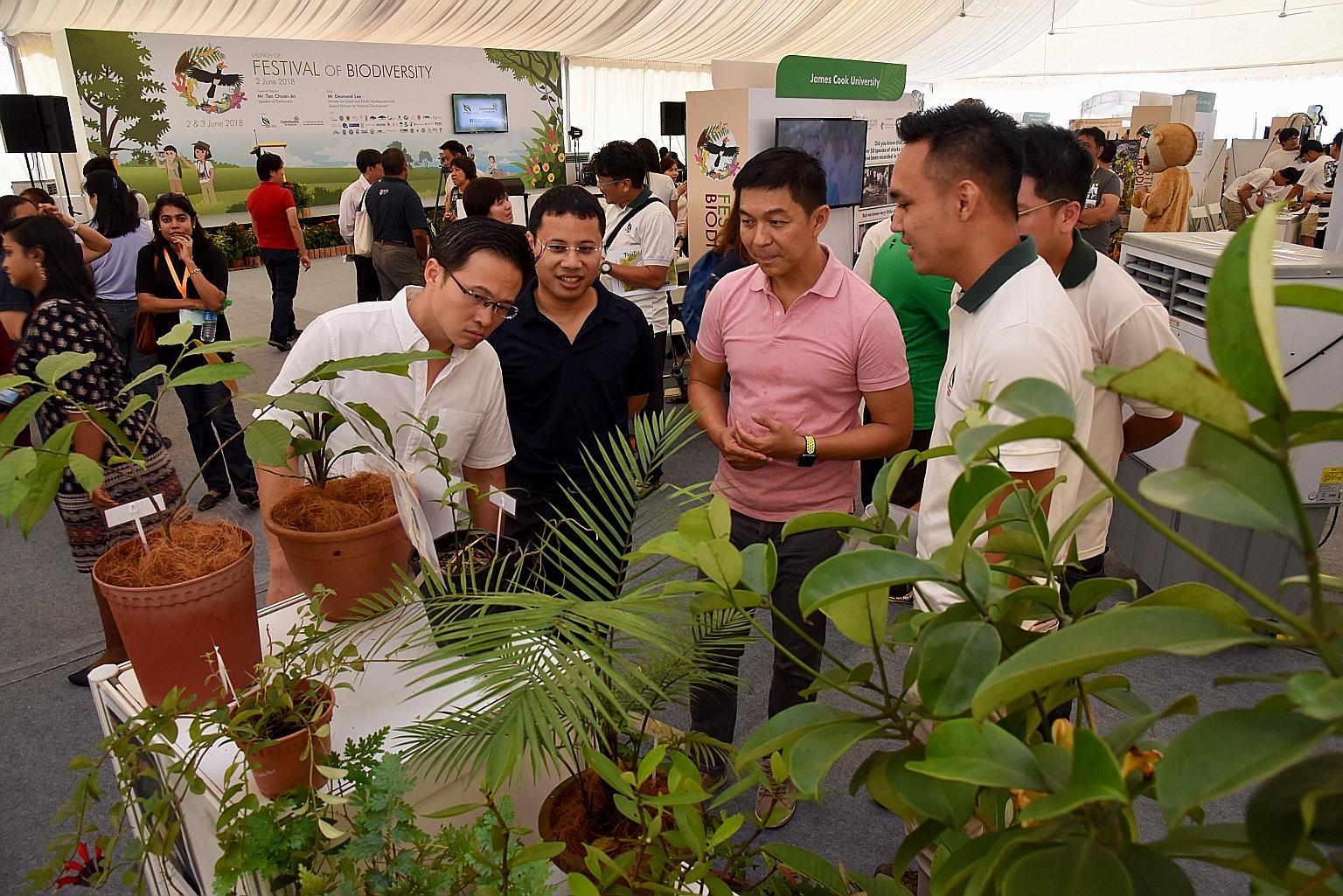Birds, bees and the conservation push
Pollinators and seed dispersers - including bats and butterflies - are targets of NParks' latest effort
Sign up now: Get ST's newsletters delivered to your inbox

Foreground, from left: Mayor for North East CDC Desmond Choo, Minister for Social and Family Development and Second Minister for National Development Desmond Lee, and Speaker of Parliament Tan Chuan-Jin visiting one of the booths at the Festival of Biodiversity, next to Tampines MRT station, yesterday morning.
PHOTO: LIANHE ZAOBAO
The birds and the bees - along with butterflies and bats - are of special interest to the National Parks Board (NParks) this year.
It is targeting these native pollinators and seed dispersers for a new conservation approach over the next five years, as Singapore continues to ensure the diversity and resilience of ecosystems that are becoming more vulnerable to climate change.
Announcing this at the seventh Festival of Biodiversity held next to Tampines MRT station yesterday morning, Speaker of Parliament Tan Chuan-Jin said these four groups of animals play important roles in Singapore's forest ecosystem, as they allow for healthier fauna and plant regeneration.
"Our efforts to conserve them will help ensure the regeneration of our forests as well as ensure the survival of the fauna species that depend on these habitats," said Mr Tan.
The festival concludes Biodiversity Week, a two-week event organised annually by NParks. The festival, which is open to the public, highlights community efforts to preserve Singapore's natural heritage.
As part of the latest push towards conservation, NParks will work on two species-specific studies, sponsored by Ascendas-Singbridge, on the movement patterns of the Green Imperial Pigeon and the Blue-rumped Parrot which disperse the seeds of native trees. Both are listed as nationally threatened species.
Research will also be conducted on the cave nectar bat - one of two native bat species that consume nectar and pollen - to study its foraging patterns, behaviour and feeding habits to better understand it.
NParks is relying on the community for the work on birds and butterflies. The public can log sightings of various species of both into a biodiversity database which will help provide information on the sort of plants certain species prefer, thus making it easier for NParks to decide where to plant them.
The two-day Festival of Biodiversity also celebrates 25 years of community involvement and stewardship in nature conservation, which falls in line with the global theme for this year's International Day of Biological Diversity on May 22.
This includes work done by community volunteers, such as those in the Friends of the Parks initiative, who organise activities in local parks or pitch in to maintain them.
Mr Abdul Wahid Badron 53, a teacher at West Grove Primary School, often hikes in Bukit Timah Nature Reserve. He would pick up litter he finds along the way and join tree-planting activities with his wife and friends. "We are park users ourselves, so we thought we should do something for the park, so we can continue seeing beautiful things in the park rather than just bald patches of ground," he said.
NParks is also broadening its community initiatives for education and outreach. It will launch a new bee-themed trail at HortPark on Sept 15 to raise awareness of various species of solitary or stingless bees here. Visitors will be able to learn about 20 different bee species found in urban gardens and the role they play in pollination.
It is also launching a set of design guidelines next year to ensure buildings are biophilic or nature-friendly. Building designers can use stickers to reduce the reflection of greenery on it, for instance, to reduce the rate of bird collisions against clear glass windows.


